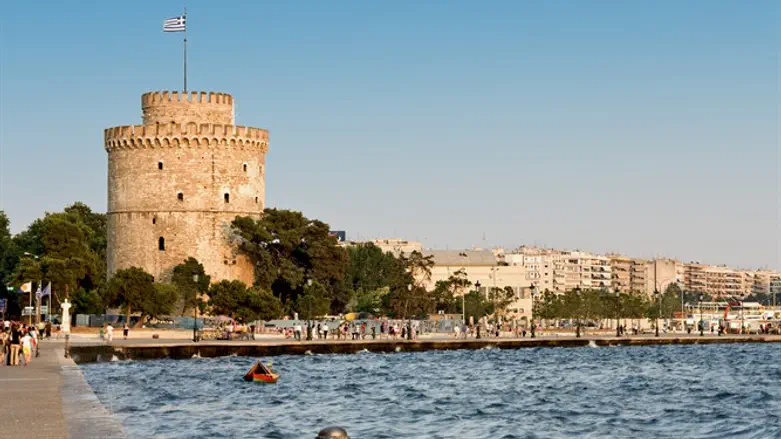
"The voices of 50,000 deported Thessaloniki Jews must not be forgotten. It is time for Greece to delve back into its memory."
Those are the heartfelt words of David Saltiel, president of Thessaloniki's Jewish community which today numbers barely a thousand, three-quarters of a century after it was nearly wiped out by the Nazis.
Sunday saw residents gather at the city's old railway station in memory of the first of 19 convoys of Jewish residents deported to Auschwitz under Nazi occupation.
Thessaloniki had a population of more than 50,000 Jews before World War II, some 46,000 of whom were deported and killed at German Nazi death camps.
Before the deportations started 75 years ago this week, the community in the city, which mainly comprised Sephardic Jews chased out of Spain in 1492, had developed to the point where it earned the nickname the "Jerusalem of the Balkans."
But then came the horrors of 1943, when virtually all of the town's Jews were deported, just four percent of them surviving the Nazi death camps to which they were dispatched.
Over the past five years, Thessaloniki has held commemorations in mid-March initiated by mayor Yannis Boutaris to remember the first of the convoys of Jews rounded up and sent off to the camps from Thessaloniki's railway station on March 15, 1943.
In January, Boutaris said the Greek authorities had been deeply remiss in waiting so long to officially commemorate the Jews' fate.
He asked: "Who has mourned neighbors who disappeared, what monuments did we erect, what ceremonies did we celebrate?"
He also denounced the looting of the belongings left behind by deportees.
By building a museum and developing memorial tourism to accompany a surge of literary works on the subject of the wartime extermination of the Greek city's Jews, the Greek authorities are now busy revisiting a sober page of their history.
In January, Israeli President Reuven Rivlin visited to lay the first stone of Thessaloniki's 7,000 square meter (75,000 square feet) Holocaust Museum, financed by Germany and the Stavros Niarchos Foundation and which is due to open in 2020.
"The Greek Jews had been wiped from collective Greek memory by the end of the 1990s," says historian Rena Molho, a specialist on the community.
It was only in 2004 that teaching about the Shoah became compulsory in Greece and ten years later that a monument would be erected at the site of the former Jewish cemetery which the Germans razed and where the city university now stands.
There are reasons for such silence.
"Few survivors were able to bear witness, some converted to Christianity and others emigrated to the United States, to Israel," says Thessaloniki University Professor Nikos Zaikos.
For Molho, Greek post-war history provides an explanation.
"Come the liberation (from German occupation) civil war broke out, communist resistance fighters were exiled and the (new) leaders, close to collaborators (with the Nazis) had no intention of speaking about the Jews."
Greeks were also too busy remembering the fact that "400,000 Greeks died in World War II and it long seemed that was more important than the deportation of Greek Jews," says Anastasio Karababas, a guide at the Shoah memorial center in Paris and author of "The Shoah -- the obsession of anti-Semitism since the 19th Century."
The leftist government of Alexis Tsipras has, however, introduced initiatives to rehabilitate the memory of Thessaloniki's Jews.
"He has accelerated construction of the museum and deepened links with Israel for economic and geostrategic reasons in a region where neighboring Turkey has latterly not proved very reassuring" politically, says Karababas.
In 2016, half a million Israelis visited Greece.
"Memorial tourism is in an embryonic phase in Thessaloniki but should develop," says Mathias Orjekh, study trip coordinator at the Paris Shoah memorial center who organized trips for some 40 people to attend Sunday's ceremony.
"As the extreme right gains ground across Europe, Greece must remind its young generation where racism and anti-Semitism can lead," warned Saltiel.
In 2016, a Pew Research study indicated 55 percent of Greeks have a negative opinion of Jews.
"It is time for Greece to stop teaching its youth a purely nationalist and Christian history," said Karababas.
Saltiel, who will soon publish in Greece a work featuring correspondence between mothers stuck in the Thessaloniki ghetto and their children who had fled to Athens, stresses "the progress of the past few years."
He points to the creation of a faculty of Hebrew studies and better-informed teachers of Shoah-related material.
Furthermore, he says, "the new museum will plan an even more important role -- replying to [Holocaust] deniers with historic proof at hand."